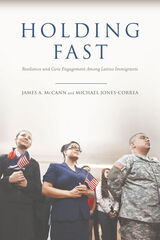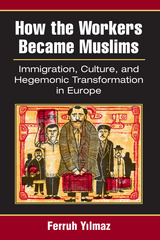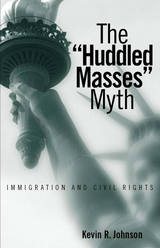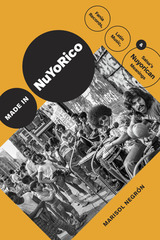124 books about Immigration and 3
start with H
124 books about Immigration and 3
124 books about Immigration
3 start with H start with H
3 start with H start with H

Holding Fast
Resilience and Civic Engagement Among Latino Immigrants
James A. McCann
Russell Sage Foundation, 2020
The fight over immigration reform and immigrants’ rights in the U.S. has been marked by sharp swings in both public sentiment and official enforcement. In 2006, millions of Latino immigrants joined protests for immigration reform. Deferred Action for Childhood Arrivals, a policy granting work permits and protection from deportation to undocumented immigrants who entered the country before age 16, was enacted in 2012, despite a sharp increase in deportations during the Bush and Obama administrations. The 2016 election of Donald J. Trump prompted a surge in anti-immigrant sentiment which threatened DACA and other progressive immigration policies. In Holding Fast, political scientists James McCann and Michael Jones-Correa investigate whether and how these recent shifts have affected political attitudes and civic participation among Latino immigrants.
Holding Fast draws largely from a yearlong survey of Latino immigrants, including both citizens and noncitizens, conducted before and after the 2016 election. The survey gauges immigrants’ attitudes about the direction of the country and the emotional underpinnings of their political involvement. While survey respondents expressed pessimism about the direction of the United States following the 2016 election, there was no evidence of their withdrawal from civic life. Instead, immigrants demonstrated remarkable resilience in their political engagement, and their ties to America remained robust.
McCann and Jones-Correa examine Latino immigrants’ trust in government as well as their economic concerns and fears surrounding possible deportations of family members and friends. They find that Latino immigrants who were concerned about the likelihood of deportation were more likely to express a lack of trust in government. Concerns about personal finances were less salient. Disenchantment with the U.S. government did not differ based on citizenship status, length of stay in America, or residence in immigrant-friendly states. Foreign-born Latinos who are naturalized citizens shared similar sentiments to those with fewer political rights, and immigrants in California, for example, express views similar to those in Texas.
Addressing the potential influence immigrant voters may wield in in the coming election, the authors point to signs that the turnout rate for naturalized Latino immigrant may be higher than that for Latinos born in the United States. The authors further underscore the importance of the parties' platforms and policies, noting the still-tenuous nature of Latino immigrants’ affiliations with the Democratic Party.
Holding Fast outlines the complex political situation in which Latino immigrants find themselves today. Despite well-founded feelings of anger, fear, and skepticism, in general they maintain an abiding faith in the promise of American democracy. This book provides a comprehensive account of Latino immigrants’ political opinions and a nuanced, thoughtful outlook on the future of Latino civic participation. It will be an important contribution to scholarly work on civic engagement and immigrant integration.
Holding Fast draws largely from a yearlong survey of Latino immigrants, including both citizens and noncitizens, conducted before and after the 2016 election. The survey gauges immigrants’ attitudes about the direction of the country and the emotional underpinnings of their political involvement. While survey respondents expressed pessimism about the direction of the United States following the 2016 election, there was no evidence of their withdrawal from civic life. Instead, immigrants demonstrated remarkable resilience in their political engagement, and their ties to America remained robust.
McCann and Jones-Correa examine Latino immigrants’ trust in government as well as their economic concerns and fears surrounding possible deportations of family members and friends. They find that Latino immigrants who were concerned about the likelihood of deportation were more likely to express a lack of trust in government. Concerns about personal finances were less salient. Disenchantment with the U.S. government did not differ based on citizenship status, length of stay in America, or residence in immigrant-friendly states. Foreign-born Latinos who are naturalized citizens shared similar sentiments to those with fewer political rights, and immigrants in California, for example, express views similar to those in Texas.
Addressing the potential influence immigrant voters may wield in in the coming election, the authors point to signs that the turnout rate for naturalized Latino immigrant may be higher than that for Latinos born in the United States. The authors further underscore the importance of the parties' platforms and policies, noting the still-tenuous nature of Latino immigrants’ affiliations with the Democratic Party.
Holding Fast outlines the complex political situation in which Latino immigrants find themselves today. Despite well-founded feelings of anger, fear, and skepticism, in general they maintain an abiding faith in the promise of American democracy. This book provides a comprehensive account of Latino immigrants’ political opinions and a nuanced, thoughtful outlook on the future of Latino civic participation. It will be an important contribution to scholarly work on civic engagement and immigrant integration.
[more]

How the Workers Became Muslims
Immigration, Culture, and Hegemonic Transformation in Europe
Ferruh Yilmaz
University of Michigan Press, 2016
Writing in the beginning of the 1980s, Ernesto Laclau and Chantal Mouffe explored possibilities for a new socialist strategy to capitalize on the period’s fragmented political and social conditions. Two and a half decades later, Ferruh Yilmaz acknowledges that the populist Far Right—not the socialist movement—has demonstrated greater facility in adopting successful hegemonic strategies along new structural lines Laclau and Mouffe imagined. Right-wing hegemonic strategy, Yilmaz argues, has led to the reconfiguration of internal fault lines in European societies.
Yilmaz’s primary case study is Danish immigration discourse, but his argument contextualizes his study in terms of questions of current concern across Europe, where right-wing groups that were long on the fringes of “legitimate” politics have managed to make significant gains with populations traditionally aligned with the Left. Specifically, Yilmaz argues that sociopolitical space has been transformed in the last three decades such that group classification has been destabilized to emphasize cultural rather than economic attributes.
According to this point-of-view, traditional European social and political splits are jettisoned for new “cultural” alliances pulling the political spectrum to the right, against the “corrosive” presence of Muslim immigrants, whose own social and political variety is flattened into an illusion of alien sameness.
Yilmaz’s primary case study is Danish immigration discourse, but his argument contextualizes his study in terms of questions of current concern across Europe, where right-wing groups that were long on the fringes of “legitimate” politics have managed to make significant gains with populations traditionally aligned with the Left. Specifically, Yilmaz argues that sociopolitical space has been transformed in the last three decades such that group classification has been destabilized to emphasize cultural rather than economic attributes.
According to this point-of-view, traditional European social and political splits are jettisoned for new “cultural” alliances pulling the political spectrum to the right, against the “corrosive” presence of Muslim immigrants, whose own social and political variety is flattened into an illusion of alien sameness.
[more]

The Huddled Masses Myth
Immigration And Civil Rights
Kevin R. Johnson
Temple University Press, 2003
Despite rhetoric that suggests that the United States opens its doors to virtually anyone who wants to come here, immigration has been restricted since the nation began. In this book, Kevin R. Johnson argues that immigration policy reflects the social hierarchy that prevails in American society as a whole and that immigration reform is intertwined with the struggle for civil rights. The "Huddled Masses" Myth focuses on the exclusion of people of color, gays and lesbians, people with disabilities, the poor, political dissidents, and other disfavored groups, showing how bias shapes the law. In the nineteenth century, for example, virulent anti-Asian bias excluded would-be immigrants from China and severely restricted those from Japan. In our own time, people fleeing persecution and poverty in Haiti generally have been treated much differently from those fleeing Cuba. Johnson further argues that although domestic minorities (whether citizens or lawful immigrants) enjoy legal protections and might even be courted by politicians, they are regarded as subordinate groups and suffer discrimination. This book has particular resonance today as the public debates the uncertain status of immigrants from Arab countries and of the Muslim faith.
[more]
READERS
Browse our collection.
PUBLISHERS
See BiblioVault's publisher services.
STUDENT SERVICES
Files for college accessibility offices.
UChicago Accessibility Resources
home | accessibility | search | about | contact us
BiblioVault ® 2001 - 2024
The University of Chicago Press









